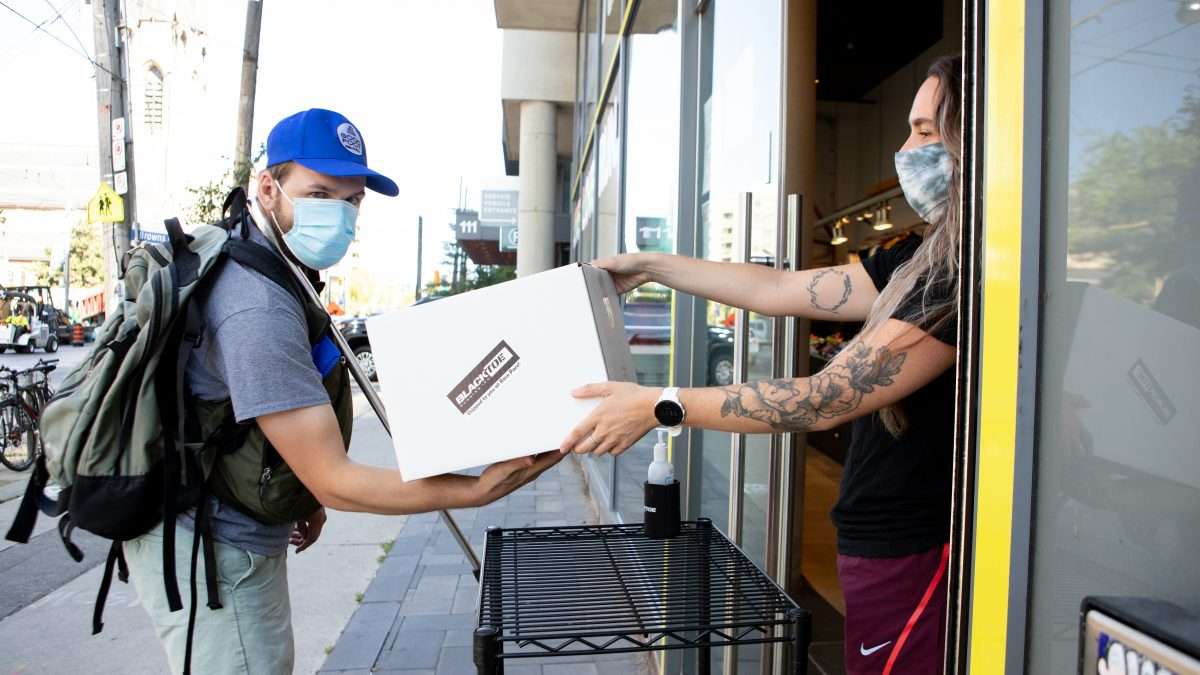
Good Foot focuses on hiring neurodivergent individuals as couriers, but also commits to supporting them through different services and learning opportunities.
Good Foot Supports Inclusion for Neurodivergent Employees
For Toronto’s Good Foot Delivery, inclusivity is more than a buzzword. According to Managing Director Barb Willett and Support and Program Supervisor Michelle Hutchinson, it’s a non-negotiable foundation of the business.
Established in 2010, Good Foot provides employment opportunities to neurodivergent individuals, who receive training to work as couriers throughout the city of Toronto.
But Good Foot does more than simply hire neurodivergent applicants. The company recognizes the challenges that neurodivergent individuals face, and provides supports and accommodations that empower Good Foot couriers to succeed and thrive.
“We have a commitment and a desire to build skills and help position individuals for success,” Willett says.
Neurodivergent people face barriers to employment
Good Foot’s approach to hiring and training begins with the awareness that neurodivergent people face direct and indirect barriers to employment.
“Neurodivergent folks are less likely to have a formal education,” Hutchinson says. “And if they’re diagnosed after high school, they won’t have had the supports during their education to explore different avenues, find out what works best for them, and understand what kinds of support they need to succeed.”
“Some workplace structures and cultures limit the ability of anyone with disabilities, neurodivergent or not, to thrive and be as successful as possible,” says Willett. “We don’t naturally create environments in which everyone feels equally welcomed.”
“A lot of the barriers are related to perception and bias,” says Hutchinson. “Because some people doubt neurodivergent folks’ ability to succeed, neurodivergent people tend to second-guess themselves and are less likely than the neurotypical population to apply for a position.”
Hiring and training protocols should support individual needs
Recognizing that neurodivergent people face multiple barriers to employment is an important first step. Good Foot directly addresses these barriers by providing supports and accommodations to prospective employees throughout the recruitment and training process.
Support begins during the virtual pre-screening, when questions are provided to participants in advance and both verbally and in the sidebar during the meeting. Good Foot staff also “loosen etiquette” for neurodivergent individuals during job interviews.
“Pacing back and forth while answering questions doesn’t mean that an interviewee is not listening to you — having that physical movement might help them focus,” Hutchinson points out. “When we interview, we give options. Would you like the lights dimmed? Would you like some fidget toys? We understand that eye contact can be difficult, so we won’t expect that of you.”
“We really focus on the individual and ask, ‘What does this person need in the moment?’ And that may or may not be related to their neurodivergence,” Hutchinson says.
During in-class training, materials are provided in a variety of formats, and staff use a scaffolded learning approach to ensure that trainees understand each learning module’s content before moving on. Neurodivergent peer training facilitators work with new hires on an ongoing basis, supporting employees through the transition from observer/trainee to independent courier.
Willett says clear communication is key throughout the hiring and training process.
“Plain language is helpful for everyone, not just for individuals from the neurodivergent community,” she points out. “You can convey the same concepts in a simpler fashion, focusing on what someone needs to know at that moment. Being thoughtful about communication and language is really important, and that can be applied to any workplace.”
Good Foot offers employees ongoing professional and social support
Once hired, Good Foot couriers have access to supports that build skills, enable them to succeed on the job, and promote their general wellbeing. For example, employees have access to the peer support facilitator who conducted their training and do regular check-ins with Hutchinson and Good Foot’s support team.
“At least once a month, we meet with the person and say, ‘How are you doing? What’s going on?’ It could be anything from retraining support to life skills,” says Hutchinson.
Good Foot offers skill-building workshops throughout the year, some mandatory and some interest based. “In the past year, we’ve held sessions on professional boundaries, communication, financial literacy, and a host of others,” Willett says.
Finally, Good Foot offers a social program, which includes weekly drop-ins and scheduled out-of-office events.
“A lot of neurodivergent folks don’t have experiences where they feel welcomed to make friends or build networks and relationships,” says Hutchinson. “That’s a big part of our social programming. It’s always great to see relationships blooming.”

Hiring neurodivergent workers benefits organizations and individuals
Willett and Hutchinson understand that not every business can provide employment to as many neurodivergent employees as they do. Many Good Foot staff have a background working with neurodivergent individuals, and the organization is partially financed by private donations and federal funding.
Nonetheless, the company’s year-over-year growth pre-pandemic, and its current growth trajectory post-pandemic, is a clear testament to the fact that hiring neurodivergent employees works.
Hutchinson says accommodating neurodivergent employees is often less daunting than many organizations believe it is.
“When someone requires an accommodation, it sounds like this complex thing,” she says. “But an accommodation could be, ‘This person needs a quiet workspace, so maybe they wear headphones during the day in a busy area.’ Companies think it will be harder to meet access needs than it is in reality.”
From Willett’s perspective, hiring neurodivergent employees brings significant added value to an organization.
“There’s a benefit in terms of brand profile – customers enjoy seeing diversity within an organization. Studies have shown that individuals from the neurodivergent community tend to be sick less often, they tend to work hard, they’re loyal to the company…there’s a level of commitment there,” Willett says. “And when you’ve got a very diverse community, you get different perspectives around the table. It changes interactions and dynamics in a very positive way.”
“Being open to the idea of inclusion is kind of the first step,” Hutchinson reflects. “My baseline is always cultivating understanding and patience, building in supports, and just looking at people as people, not numbers. Everybody benefits when you put these kinds of measures in place, regardless of neurodivergence, disability, or whatever. Everybody gets something out of it.”
